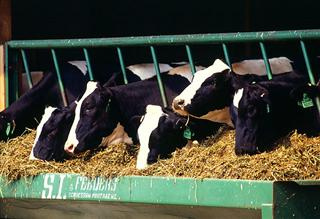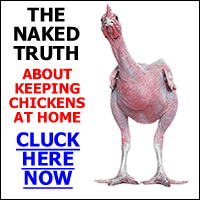 Gaye Levy, Contributor
Gaye Levy, Contributor
Activist Post
Over the course of the past few months, I have spent a good deal of time reflecting on my mostly healthy diet, my relatively good health, and the possible if not probable relationship between the two. It has been quite the journey of discovery.
Starting with the documentaries Forks Over Knives (what we put on our forks may eliminate the need for the surgical knife), Food, Inc. (big business controlling our food supply), Hungry For Change and the Temple Grandin story, I have tried to debunk some of the hearsay out there so that I can make sensible decisions about the foods I consume. And believe me, there is a lot of misinformation and innuendo out there.
Today, without getting preachy, I would like to challenge you to open up your mind to altering the way you eat not only for your own long-term health, but also for long term sustainability of the agricultural resources on our planet and the humane and responsible treatment of farm animals.
There Are No Happy Cows
If I were to suggest a single source for beginning the education process, I would start with the John Robbins book, No Happy Cows. For those of you that are not familiar with John’s work, he is the son of the founder of the Baskin-Robbins empire. But instead of taking over the family business, he chose to become a food activist and an advocate for diets rich in fruits, vegetables and plant-based products.
This book will lead you through a path of discovery, including:
- Soy products, good or bad?
- Grass-fed beef, is it all that it is cracked up to be?
- The dirty deal with industrial food production.
- Greed as it relates to the food we eat.
Heavy stuff, I know, but thankfully it is written in an easy to read, non-judgmental (to the reader at least) manner.
Perhaps I have been naïve, but most striking to me was his description of the deplorable conditions our farm animals must endure, from chickens to cows to pigs. This took me back to a piece about young calves I saw on 60 Minutes in the ’70s – to this day I have never even taken a taste of veal. It was that revolting.
Here is what the Humane Society says about the treatment of young calves:
Intensive confinement of calves raised for veal has long raised pointed concerns regarding the animals’ welfare. Traditional production practices include individually isolating calves in narrow wooden stalls or pens, which severely restrict movement, feeding the animals an all-liquid diet deliberately low in iron, and prematurely weaning the animals. Stressful conditions lead to a high incidence of stereotypic behavior and illness.
Scientific reviews of the welfare of intensively confined calves raised for veal have concluded that the young animals suffer when reared in conventional systems.
The Truth About Milk Cows
 There is a well-known “Happy Cows Come from California” marketing campaign by the California Milk Producers’ Association in which healthy, talking cows stand on spacious, green pastures and declare that “great cheese comes from happy cows, and happy cows come from California”. And yet nothing could be further from truth. First of all, the commercial was filmed on the grassy land of New Zealand, and not California. But more important, the book describes the truth about California cows: most never see a single blade of grass.
There is a well-known “Happy Cows Come from California” marketing campaign by the California Milk Producers’ Association in which healthy, talking cows stand on spacious, green pastures and declare that “great cheese comes from happy cows, and happy cows come from California”. And yet nothing could be further from truth. First of all, the commercial was filmed on the grassy land of New Zealand, and not California. But more important, the book describes the truth about California cows: most never see a single blade of grass.
Instead, they are housed in pens where they can not turn around and where they stand knee high in their own excrement for most of their adult life. They are injected with hormones, fed antibiotics, and in Robbins words, “treated without compassion like four-legged milk pumps.”
And then there is the issue of hormones in our milk.
Dairy cows are injected with human growth hormones (rBST) in order to increase milk production. Did you know that infants in China who are fed formula have been growing breasts? According to the official Chinese newspaper, medical tests performed on babies between four and fifteen months old found levels of estrogen as high as those in adult women. The consensus is that the hormone rich formula is responsible. And where did these hormones come from? Milk from dairy cows.
Here is the part that I do not get: the United States is one of the few countries in the world that still allows bovine growth hormones to be injected in dairy cows. This is banned in Canada, Japan, New Zealand, Australia and most of Europe. Why is this happening? Dare I say that our government (and this includes the politicians as well as agencies such as the USDA) are more loyal to Monsanto, Eli Lilly, and other corporations with deep pockets, than to the people they serve.
John Robbins’ explains the inspiration behind the title of his book:
There are no happy cows in the industrialized food system. There’s something about that contrast between what they’re portraying and the reality that exists in California dairy production that strikes me as a perfect example of why we have to wake up.
Turning the Corner as a Food Activist – A Personal Choice
There is more. Have you ever bothered to learn what “Fair Trade Certified” really means? Very briefly, items that are fair trade certified carry an independent, third-party-verified guarantee that the farmer has been paid a fair price for his products, has had direct involvement in the marketplace, and has upheld environmental and labor rights standards. You will find the Fair Trade Certified label on many agricultural products, the most common being cocoa, coffee, bananas, tea, and sugar.
Oh, it also means that the items have not been genetically modified.
Now did I know this before? I suppose I knew about it peripherally, but never pursued it beyond that cursory knowledge. After reading John Robbins’ description of the harvesting of cocoa (for chocolate) by children tricked or sold into slavery, I stood up and took notice. Did I want to support this cruel and inhumane exploitation when for a few pennies more I could purchase fair trade certified chocolate? I think you know the answer.
 And so I come around to the gist of the matter: as with all things political and all things government, we have a choice not only with the food we eat, but with the methods by which they are grown and harvested. At some point we must make decisions for ourselves based upon health, budget and moral considerations.
And so I come around to the gist of the matter: as with all things political and all things government, we have a choice not only with the food we eat, but with the methods by which they are grown and harvested. At some point we must make decisions for ourselves based upon health, budget and moral considerations.
To that end I suggest that we each become a food activist in a manner that is appropriate to your situation. Although what is right for one person may be wrong for another, you have no basis to judge unless you arm yourself with knowledge. It is only then that you can become both judge and jury.
The Final Word
If you care about the rising epidemic of obesity, food contamination, the perils of GMO foods and the proliferation of controlled animal feeding operations, take a couple of hours to educate yourself. Grab yourself a copy of No Happy Cows or watch one of the videos that are available for streaming through your Netflix account or for purchase at Amazon. Seek out more information at websites such as Green America.
What else?
When it comes to the food you eat, challenge yourself to take a look at your diet to see what you can do to add more plant-based items to your daily fare.
As a consumer, seek out milk and dairy products that are rBST free. Check your labels. For example, Safeway store’s Lucerne brand – typically the least expensive option in the dairy case – is rBST free.
Purchase only fair trade certified chocolate. It is more widely available than you think and often at the same price as chocolate produced under the shroud of tyranny.
Finally, recognize that ignorance is no longer bliss.
RELATED ACTIVIST POST ARTICLES:
rBGH Milk Production: Animal Cruelty, Genetically Modified Hormones and E. Coli
Georgia’s poultry CAFOs extreme case in cruelty, eco-hazards; but alternatives abound
Read other articles by Gaye Levy here.
Gaye Levy, the SurvivalWoman, grew up and attended school in the Greater Seattle area. After spending many years as an executive in the software industry, she started a specialized accounting practice offering contract CFO work to emerging high tech and service industries. She has now abandoned city life and moved to a serenely beautiful rural area on an island in NW Washington State. She lives and teaches the principles of a sustainable, self-reliant and stylish lifestyle through emergency preparation and disaster planning through her website at BackdoorSurvival.com. SurvivalWoman speaks her mind and delivers her message with optimism and grace, regardless of mayhem swirling around us. Enjoy your next adventure through common sense and thoughtful preparation!
var linkwithin_site_id = 557381;
linkwithin_text=’Related Articles:’


Be the first to comment on "Busting the Myth: There are No Happy Cows in the Industrialized Food System"